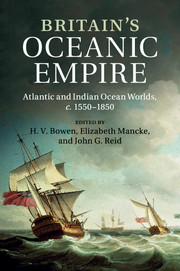25 results
18 - A Maritime World
- from Part V - Institutions
-
-
- Book:
- The Cambridge History of America and the World
- Published online:
- 12 November 2021
- Print publication:
- 03 March 2022, pp 403-422
-
- Chapter
- Export citation
Maps
-
- Book:
- Britain's Oceanic Empire
- Published online:
- 05 June 2012
- Print publication:
- 31 May 2012, pp vii-vii
-
- Chapter
- Export citation
Part II - Sovereignty law, and governance
-
- Book:
- Britain's Oceanic Empire
- Published online:
- 05 June 2012
- Print publication:
- 31 May 2012, pp 67-176
-
- Chapter
- Export citation
1 - Introduction:
-
-
- Book:
- Britain's Oceanic Empire
- Published online:
- 05 June 2012
- Print publication:
- 31 May 2012, pp 1-12
-
- Chapter
-
- You have access
- HTML
- Export citation
Britain’s Oceanic Empire - Title page
-
-
- Book:
- Britain's Oceanic Empire
- Published online:
- 05 June 2012
- Print publication:
- 31 May 2012, pp iii-iii
-
- Chapter
- Export citation
Part I - The oceans
-
- Book:
- Britain's Oceanic Empire
- Published online:
- 05 June 2012
- Print publication:
- 31 May 2012, pp 13-66
-
- Chapter
- Export citation
Abbreviations
-
- Book:
- Britain's Oceanic Empire
- Published online:
- 05 June 2012
- Print publication:
- 31 May 2012, pp xv-xv
-
- Chapter
- Export citation
Copyright page
-
- Book:
- Britain's Oceanic Empire
- Published online:
- 05 June 2012
- Print publication:
- 31 May 2012, pp iv-iv
-
- Chapter
- Export citation
Britain’s Oceanic Empire - Half title page
-
- Book:
- Britain's Oceanic Empire
- Published online:
- 05 June 2012
- Print publication:
- 31 May 2012, pp i-ii
-
- Chapter
- Export citation
16 - Britain’s oceanic empire:
- from Part IV - Commercial and social relations
-
-
- Book:
- Britain's Oceanic Empire
- Published online:
- 05 June 2012
- Print publication:
- 31 May 2012, pp 433-450
-
- Chapter
- Export citation
Part III - Diplomatic and military relations
-
- Book:
- Britain's Oceanic Empire
- Published online:
- 05 June 2012
- Print publication:
- 31 May 2012, pp 177-308
-
- Chapter
- Export citation
Index
-
- Book:
- Britain's Oceanic Empire
- Published online:
- 05 June 2012
- Print publication:
- 31 May 2012, pp 451-464
-
- Chapter
- Export citation
Contents
-
- Book:
- Britain's Oceanic Empire
- Published online:
- 05 June 2012
- Print publication:
- 31 May 2012, pp v-vi
-
- Chapter
- Export citation

Britain's Oceanic Empire
- Atlantic and Indian Ocean Worlds, c.1550–1850
-
- Published online:
- 05 June 2012
- Print publication:
- 31 May 2012
Part IV - Commercial and social relations
-
- Book:
- Britain's Oceanic Empire
- Published online:
- 05 June 2012
- Print publication:
- 31 May 2012, pp 309-450
-
- Chapter
- Export citation
Frontmatter
-
- Book:
- Britain's Oceanic Empire
- Published online:
- 05 June 2012
- Print publication:
- 31 May 2012, pp xvi-xx
-
- Chapter
- Export citation
Contributors
-
-
- Book:
- Britain's Oceanic Empire
- Published online:
- 05 June 2012
- Print publication:
- 31 May 2012, pp viii-x
-
- Chapter
- Export citation
14 - Anglo-Amerindian commercial relations
- from Part IV - Commercial and social relations
-
-
- Book:
- Britain's Oceanic Empire
- Published online:
- 05 June 2012
- Print publication:
- 31 May 2012, pp 370-406
-
- Chapter
- Export citation
Preface
-
- Book:
- Britain's Oceanic Empire
- Published online:
- 05 June 2012
- Print publication:
- 31 May 2012, pp xi-xiv
-
- Chapter
- Export citation
Early Modern Imperial Governance and the Origins of Canadian Political Culture*
-
- Journal:
- Canadian Journal of Political Science/Revue canadienne de science politique / Volume 32 / Issue 1 / March 1999
- Published online by Cambridge University Press:
- 10 November 2009, pp. 3-20
-
- Article
- Export citation



